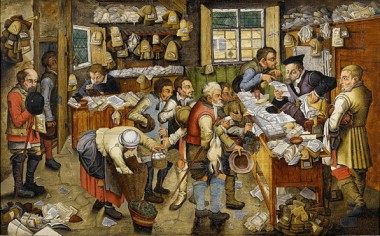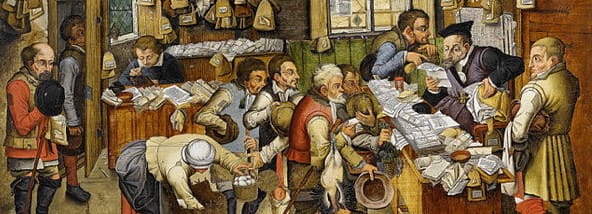“Business is business,” as the saying goes. It sometimes means to check Jesus at the door. Outside of religious organizations, the chain of command does not usually recognize God as the real CEO.
 What’s God got to do with business? After all, not everyone even believes in him. So, why should God have a place in the workday? A big reason is because the devil never calls in sick for work. He is there every day. He is present in the gossip around the water cooler. He is a matchmaker for office affairs. The devil likes to create momentum that makes one feel like there is no other way or no turning back. He encourages lying, prideful ambition, greed, jealousy, stealing, and stifling a conscience. Cheating a boss out of work time, doctoring records, giving less than your best…are all in a day’s work for the devil.
What’s God got to do with business? After all, not everyone even believes in him. So, why should God have a place in the workday? A big reason is because the devil never calls in sick for work. He is there every day. He is present in the gossip around the water cooler. He is a matchmaker for office affairs. The devil likes to create momentum that makes one feel like there is no other way or no turning back. He encourages lying, prideful ambition, greed, jealousy, stealing, and stifling a conscience. Cheating a boss out of work time, doctoring records, giving less than your best…are all in a day’s work for the devil.
And where is Jesus? He is with you always if you choose to take him with you. But if you do, then business is no longer just business.
I know well that there are times at work when one must stand his ground and risk consequences. For instance, when my husband was offered an afternoon radio talk show, it was assumed that the psychic who was a once-a-month guest would be included. After all, the phone lines always lit up with callers when she was on. But there was no way a Catholic could be faithful and promote a psychic. The station relented and allowed her to be dropped from the show, but we were ready to reject the job if the psychic came with it.
I have worked in the fields of social work and public administration and know that sin is often more welcome than Jesus. Even in the helping professions, compassion without religion goes awry such as advocating for birth control and abortions for girls in foster care, or rejecting religion in the place of humanism.
Workplace Christianity
Although I work at home these days, through my writing, I have met two businessmen committed to encouraging people to stand their ground and take Jesus with them to work. Bill Dalgetty is the author of Hope for the Workplace: Christ in You. It is for the employed who answer to an authority greater than their boss. He challenges the notion that Christians are not welcome in the workplace and claims that Christians are often generously represented in business. More importantly, he contends that by living their faith, they make a difference.
Dalgetty acknowledges that the workplace is demanding and competition can breed insecurity, resentment, and stress. Often in cases where corporate greed and deceit are uncovered, it is not just the case of immoral employees dragging a company down, but rather Christians compartmentalizing their lives and checking their faith at the door.
“Early in my career as a young attorney for Mobil Corporation, I thought I was on an upward track, and my ambition to succeed began to dominate the choices in my life. Everything else–my wife, my children, and my relationship with God–began to take second place,” he wrote. “I continued to go to Mass every Sunday and I loved my family, but my career and moving up the corporate ladder became paramount in my life.”
It was his wife’s attendance in a “Week of Renewal “ at church that reordered his priorities. Dalgetty joined her on the last night for the healing service. He had a deep spiritual experience with Christ that changed him. After that night, business was no longer just business anymore. Dalgetty sought to infuse Christian inspiration at work through his own example. His book is a continuation of that mission. He references his own experiences and those of other business leaders. In some cases, integrity wins the day and an employee is justly rewarded. In other cases, employees are let go or hurt in some way and yet, with their integrity intact, they come away from the experience stronger, knowing that their relationship with Christ was more important.
Randy Hain, in his book, The Catholic Briefcase: Tools for Integrating Faith and Work, also challenges people to strive for holiness in the workplace. He uses Scripture, Catholic teaching, and real-life situations in order to show just how it can be done. Hain, through his experiences as the managing partner of Bell Oaks Executive Search, knows that sprinkling people with holy water and preaching the Gospel from a desk, is not going to cut it in the office. But he encourages Christians to integrate faith and work.
As a convert to the Catholic Church in 2005, Hain is passionate about his beliefs. He co-founded the popular Integrated Catholic Life e-magazine in 2010 with Deacon Mike Bickerstaff and is also a co-founder of the Annual Atlanta Business Conference. He encourages people not to separate religion from work because it is often the place where we have the greatest opportunity to demonstrate our faith.
“Most of us spend the majority of our waking adult lives at work,” he writes. “The workplace today is a challenging environment in which to be open about our Christian beliefs. Political sensitivity, rigid company policies, and simple fear have led many of us to compartmentalize our faith in unhealthy and unnatural ways.”
Hain admits that sometimes he struggles with placing every aspect of his life in God’s hands but throughout the day he prays, “I surrender Lord, please lead me.”
He recognizes the importance of doing well at work, but in his book, he helps to prioritize the vocation of serving God as the driving force behind that work. For in the end, he reminds us that we are made for heaven and the path to get there simply leads through the workplace.
+
Art for this post Take Jesus to Work Because the Devil Will be There: The Payment of the Tithes (The tax-collector), also known as Village Lawyer; Pieter Brueghel the Younger or workshop 1617-1622, photographed by Bonhams, PD-US author’s life plus 100 years or less, published in the U.S. prior to January 1, 1923, Wikimedia Commons.




